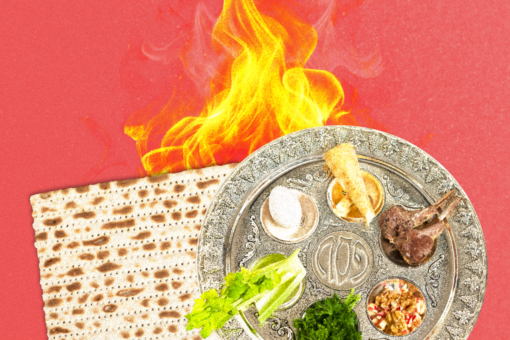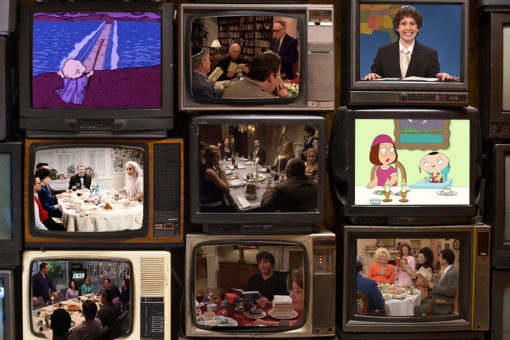As a rabbinical student, I’m used to navigating between communities in my public and personal life. I’m a Jew-by-choice, an interfaith organizer, and a rabbinic intern at B’nai Jeshurun in New York City. But since the COVID-19 virus has disrupted almost every aspect of daily life, I’ve been isolating with my interfaith family — my observant Jewish spouse, Catholic mom, and secular Francophone siblings — in rural North Carolina.
In theory, this should be easy: I converted to Judaism in 2011 after years of study, so my family has balanced our different religious identities for well over a decade. Much of my professional work centers around these same questions, making space for multi-faith and “Jew-ish” families and individuals in my communities in New York. On paper, all of the pieces should fit together, granting my family some real grounding in the midst of a global crisis. In reality, it’s been a journey of space-making and compromise.
After a decade where the five of us have been spread out over three continents and many different countries (France, Israel, the USA — my sister actually just came home from work in Jordan!), we’re all back together in the same home. It’s been both heart-stretching, goofy, and occasionally inspiring as we’ve learned to navigate everything from conflicting work and school schedules to celebrating birthdays, Passover, and Easter.
From my sister making spaghetti for herself off-camera while we celebrated a Passover seder over Zoom with my thesis advisor, to dyeing Easter eggs and making havdalah candles together, we have learned how to navigate our boundaries and embrace the different religious practices under our one roof. Occasionally there have been difficult moments, but we are also working not to let perfect be the enemy of the good. Here is what we’ve found most helpful:
Boundaries
Much of the rabbinic tradition has depended upon careful maintenance of communal boundaries. The rabbis of the Talmud dedicated an entire tractate to exploration of the limits and convergences in the lives of Jewish people and their non-Jewish neighbors, particularly around the very acts that draw people closer across lines of difference: sharing food and living space, observing Shabbat, even interacting with each other’s animals.
I’m not sure what the rabbis of 5th century Babylonia would think of me in 2020, a year away from semikha– rabbinic ordination- in the midst of a pandemic and living in close quarters with my Catholic and secular family members and their dog. But while my situation might be unimaginable to those ancestors, I’ve worked to reimagine those boundaries in loving relationship with both my family and with the tradition I have grown into and love.
For one thing, I had to accept early on that keeping kosher in my mom’s kitchen in North Carolina was not going to look the same as in my New York apartment. While I work to keep some cookware separate and my spouse and I keep a kosher-pescatarian diet, my whole family shares the same oven and stovetop (and isn’t shy about their love of bacon for breakfast!). When my family wants to make s’mores, I don’t enjoy the whole dessert but still take part in some chocolate and spending time alongside my non-kosher marshmallow-roasting family.
Shabbat can also be a source of complication. While there are some activities that we can’t participate in during the 25 hours from sundown Friday to Saturday night, my spouse and I work hard to navigate ways to stay involved with our family while staying observant. Maintaining this balance has required us to leave no stone unturned conversationally: The more everyone is upfront about their needs, restrictions, and expectations for the day, the more successful and tension-free are our Shabbatot.
My family is extraordinarily accepting when I explain why I need to cook dinner early on Friday afternoon, or that I won’t be checking my phone or touching the TV during the 25 hours. I’ve also found it to be an interesting review of my own practice as I have to re-detail my observance in a way that is concise and understandable to someone who does not practice Judaism.
For all of their empathy and understanding, parts of my Jewish practice don’t always make sense to my family of origin. Both of our faith traditions recognize rituals like daily prayer and blessings over food, but it can be difficult for my mom to understand that my choice not to eat certain ingredients or abstain from work one day a week are not about self-denial or “giving up” something in pursuit of spiritual sacrifice, but instead small acts of sanctification, ways of observing boundaries that allow me to spend time in pursuit of alignment with the Divine. But even when my observance doesn’t make sense to my family, they have given me and my spouse the space in our shared home to practice our Judaism in a way that is deeply meaningful for us.
Shalom Bayit
In conversation with all of this boundary-setting and negotiation is the Jewish value of shalom bayit, peace in the home. While shalom bayit is traditionally invoked to refer to marital harmony, it has been a useful principle to guide my interactions with my family, along with the mitzvah of kibud av, honoring one’s parent.
For me, this means living in the spirit of compromise. My ritual practice is meaningful in and of itself, but is also a practice of heart-softening, helping me to open myself to greater awareness of both God and of the dignity of others around me. The boundary-setting I may practice around some aspects of Jewish observance reminds me to be more aware of ways I can be helpful and accommodating of my family members and their needs, whether it’s my sister’s early start time at work or being present for my mom and brother as they navigate difficult life and work transitions.
Finding the fun
What’s been most essential to finding our new social isolation groove can’t be sourced from the Talmud, but is no less crucial. After years of finding snatches of conversation between time zones and mastering the art of the intergenerational family group chat, we’ve embraced the spontaneity that temporarily living together affords us.
We’ve had more than one dance party after doing the mountain of dishes that dinner for five creates (Mom likes the BeeGees, my little brother and I like New Order, but everyone can agree on the Neville Brothers). We have a family group chat where we plan the next movie night and share memes — and a second chat for the grown-ups, where we swap cocktail recipes and discuss some of the more intense aspects of the COVID-19 virus and its effects on our extended family and communities.
Embracing silliness has been a powerful antidote to our uncertainty over the future in the wake of the virus. Practical jokes, increasingly competitive rounds of Bananagrams, family walks, and laughing at the latest TikTok trend or Twitter meme punctuate our work and school hours. After so many years apart, it’s a gift to be able to share resources and time together while we are in isolation, the joy of reunion supporting our resilience as we weather the current crisis.
Header image design by Grace Yagel; original illustrations by ONYXprj / Getty Images.



